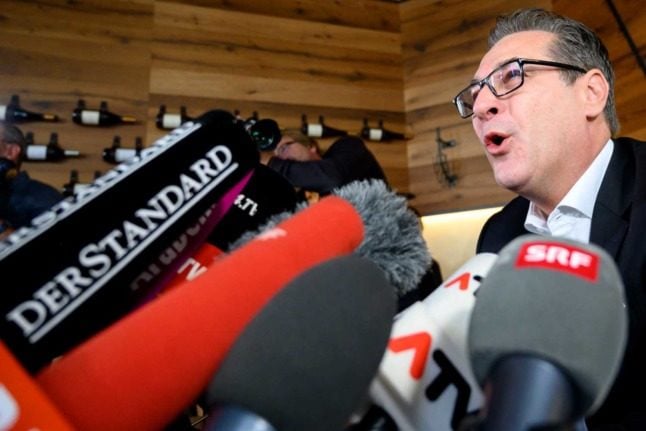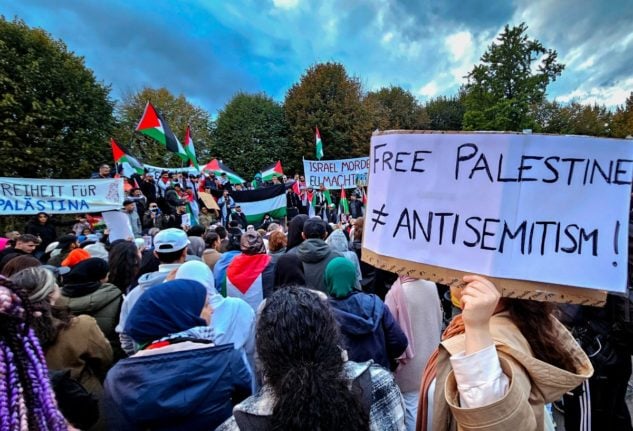The Ibiza scandal – nicknamed Ibizagate by Austrian media – can be traced back to a meeting in 2017 on the Spanish resort island of Ibiza between Strache, then leader of the far-right Freedom Party (FPOe), and a woman posing as the niece of a Russian oligarch.
Strache was filmed promising the woman state contracts in exchange for helping his party to campaign for elections on an anti-migration, anti-Islam plank.
Strache also discussed the possibility of the woman buying Austria’s most-read tabloid, Kronen Zeitung, and making its editorial line more pro-FPOe.
He did not know the meeting was a sting and that he was being filmed.
The video surfaced in German media in May 2019 and led to the collapse of a coalition government composed of the FPOe and the centre-right People’s Party (OeVP) of Chancellor Sebastian Kurz.
What charges have been brought?
Strache claimed in the video that several high-profile billionaires, as well as international gambling company Novomatic, had funded political parties through illegal donations to associations.
All those named by Strache deny any wrongdoing. Strache attributed what he said in the video to intoxication and claimed he may have been drugged.
So far only Julian Hessenthaler, a private detective who helped orchestrate the video, has been arrested, based on drug-related offences for which he faces 15 years in prison.
However, a judicial investigation launched after the video was released led to the seizure of mobile phones belonging to Strache and several other politicians, which opened the way for no fewer than 12 separate probes into allegations of wrongdoing.
The trial revolves around charges that Strache offered to change a law to help an FPOe donor friend of his secure public funding for his private hospital – Strache was found guilty years later.
READ ALSO: Former Austrian vice chancellor convicted over corruption
What is the crrent fallout?
One of the investigations focuses on alleged ties between Novomatic and senior political figures. The most high-profile target is OeVP Finance Minister Gernot Bluemel, a close confidant and ally of Kurz.
It is looking into possible payments made by Novomatic to the OeVP in return for “help… with tax liability that the business was facing abroad”, according to prosecutors.
Bluemel attracted ridicule when investigators raided his home in February, right as his partner took his laptop out for a stroll with the couple’s baby.
Bluemel and Novomatic deny any wrongdoing – the Finance Minister later resigned his position, saying he wanted to go into private sector and spend time with his family.
The fall of the chancellor
Kurz and Bluemel have both also hit the headlines for allegedly helping civil servant Thomas Schmid clinch a lucrative post as head of OeBAG, a company that administers the Austrian state’s holdings in various companies.
In leaked chat messages referring to the process of setting up OeBAG, Kurz wrote to Schmid: “You get everything you want,” adding several “kiss” emojis, to which Schmid replied: “I’m so happy :-))) I love my chancellor.”
Investigators have also since discovered chats suggesting that Schmid helped write the specifications for the job he applied for.
READ ALSO: Profile: Austria’s ex-Chancellor Sebastian Kurz, the one-time ‘Wunderkind’
Kurz is also under investigation for making false statements to a parliamentary committee over the affair, an offence that can carry a prison sentence of three years. He was also implicated in an investigation over whether or not he, with the help of the Finance Ministry, bribed Austrian media to publish positive polls before his election.
After pressure from coalition partners, and the opposition, he resigned as chancellor and, weeks later, left politics altogether.



 Please whitelist us to continue reading.
Please whitelist us to continue reading.
Member comments